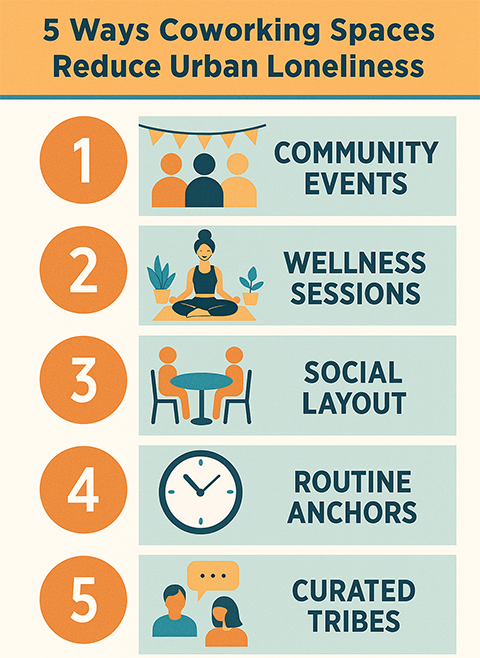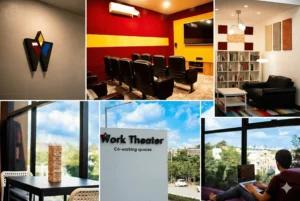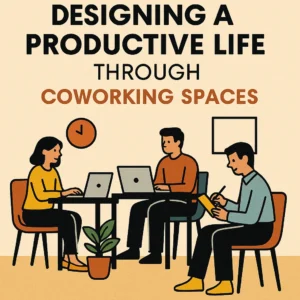If you live in city and go to an office, it is highly likely that you may have used coworking spaces.
In a world where millions are digitally connected but emotionally isolated, urban loneliness has quietly reached epidemic levels. As cities grow denser and lifestyles more fragmented, professionals, especially freelancers and remote workers, often find themselves caught in a paradox — surrounded by people, yet profoundly alone.
During this quiet crisis, a modern evolution of work may be offering something more than just flexible desks and high-speed Wi-Fi. Coworking spaces, once designed purely for productivity and affordability, are increasingly becoming hubs for human connection — perhaps even a remedy for urban loneliness.
Understanding Urban Loneliness
Urban loneliness is not just a feeling — it’s a documented public health concern. A 2018 study published in The Lancet highlighted that social isolation has become a predictor of premature mortality, comparable in risk to obesity and smoking. And cities — with their anonymity, transience, and over-reliance on virtual communication — seem to exacerbate the condition.
With more professionals choosing freelance, hybrid, or remote lifestyles, traditional office culture has given way to independence — but also to isolation. The watercooler chats, the impromptu brainstorms, and even the simple rituals of commuting and lunching together are no longer default social anchors.
That’s where coworking steps in.
Take the page on “Why Should I Use a Coworking Space?”—it highlights how shared offices aren’t just cost-efficient but also emotionally nourishing. These spaces are designed for interaction, whether you’re brainstorming at the whiteboard wall, sharing a filter coffee, or swapping ideas in a breakout zone.
More Than a Desk: A Community
Modern coworking spaces are intentionally designed for more than work. They host networking events, community lunches, workshops, open mic nights, yoga classes, and even game nights. What they truly offer is a third place — not home, not office, but a communal ground where professionals across disciplines cross paths.
One study found that 84% of coworkers feel more engaged and less lonely thanks to the informal interactions in these shared spaces (Deskmag Coworking Survey). These interactions don’t just alleviate loneliness — they become catalysts for personal growth, collaboration, and even friendship.
Just as the article on “How Freelancers Thrive in Coworking Spaces” explains, freelancers find not only discipline in a coworking space—but human connection.
Call us to reserve your space at Work Theater
The Psychology Behind Connection
From a neuroscience perspective, human brains are wired for connection. Regular social interaction activates reward centers in the brain, boosting oxytocin (the bonding hormone) and reducing cortisol (the stress hormone). According to a report in the Harvard Business Review, having “a best friend at work” was strongly correlated with increased productivity and overall happiness.
Coworking, by virtue of proximity and shared routine, recreates this social rhythm. While not everyone will find a best friend, the gentle hum of conversation, casual nods, and ambient human presence are proven to improve emotional well-being.
How Coworking Spaces Are Evolving to Combat Loneliness
The best coworking spaces are not accidental communities — they’re intentionally designed ecosystems.
Some ways in which they tackle urban loneliness:
- Community Curation: From interest-based clubs to industry-specific groups, many coworking spaces curate communities, ensuring that people feel seen and supported.
- Wellness Programming: Mindfulness sessions, movement breaks, and therapy tie-ups address emotional health directly.
- Hybrid Work Anchors: As hybrid becomes the norm, people crave “drop-in” anchors — places they can visit occasionally but still feel part of a tribe.
- Design-Driven Socialization: Layouts that encourage interaction — like shared kitchens, open lounges, and brainstorming corners — facilitate serendipitous conversations.
Real-World Reflections
Consider the quiet writer who joins a coworking space to escape her apartment walls and ends up forming a peer critique circle. Or the tech founder who discovers a meditation partner during a lunchtime workshop. Or the young designer who moves to a new city and finds their first few friends through casual Friday socials.
These aren’t rare exceptions — they’re increasingly the norm in thoughtfully managed coworking environments.
Why This Matters for Cities
When coworking spaces thrive, so do cities. These spaces become hyperlocal micro-communities that drive foot traffic to nearby cafés, bookstores, and gyms. They humanize city infrastructure, injecting warmth and familiarity into otherwise transactional neighborhoods.
Moreover, by distributing workspaces across urban landscapes — rather than concentrating them in central business districts — coworking encourages more localized, sustainable city living.
Optimizing Your Coworking Experience to Combat Loneliness
If you’re considering joining a coworking space, here are a few strategies to truly experience its social benefits:
- Pick a Space With Community Intent: Look for spaces that don’t just offer desks, but also host events and cultivate interaction.
- Attend Events (Even If It Feels Awkward at First): It takes just one conversation to break the ice.
- Offer, Don’t Just Seek: Share your expertise, help someone troubleshoot, or organize a lunch outing — giving often sparks deeper connections.
- Anchor Yourself to Routines: Visit the same days every week. Consistency builds familiarity.
Internal Case Example
In Bangalore, several boutique coworking studios have quietly transformed the creative work landscape. Spaces intentionally designed for freelancers, startup founders, designers, and writers offer more than aesthetics — they nurture belonging. From communal theaters to ideation corners, these spaces give creativity a home and connection a stage.
If you’re looking for guidance on how to pick such a workspace, this freelancers coworking guide can help you navigate the decision.
Or, for those curious about how neuroscience informs these workspaces.
Key Takeaways
- Urban loneliness is a rising concern, especially among freelancers and remote professionals.
- Coworking spaces offer more than productivity — they provide real social interaction, mental wellness benefits, and a sense of belonging.
- The design, programming, and ethos of modern coworking environments are evolving specifically to combat emotional isolation.
- Freelancers and hybrid workers can proactively use coworking to rebuild their social routines.
- As a broader urban trend, coworking contributes to healthier, more connected cities.
Bonus: Routines That Anchor and Empower
Loneliness often stems from the absence of structured, meaningful interactions. Traditional office-goers had water cooler chats and group lunches. Remote workers? Not so much.
Coworking spaces bridge this gap through routine:
- Weekly community breakfasts
- Interest-based meetups
- Wellness sessions (as explored in “Is It Worth Taking Up a Coworking Space?”)
This structure allows people to show up—not just for work, but for each other.
Explore our podcast
Call us to reserve your space at Work Theater
Learn more about our coworking space on our YouTube channel Work Theater Studios where we talk about a variety of topics including personal finance, entrepreneurship, business and life.
Fun fact! We also have a private theatre in Bangalore.




